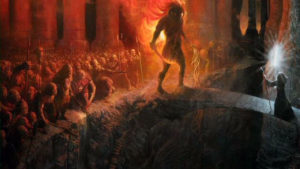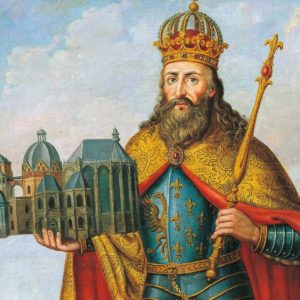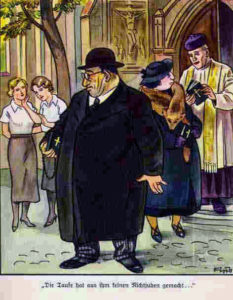In 1980, when I was much younger, my dad invited me to watch Cosmos, in his words, ‘the best television show’. And indeed, Cosmos really captivated me. I watched it again last month, but from the point of view of a mature César who has emerged from the cave of the three-eyed raven (cf. the final pages of The Grail).
I have already posted a couple of entries about Cosmos in 2012 and 2017 but now I would like to elaborate on a few points.
In the first episode Sagan introduces us to what will be this thirteen-episode series, and in the opening moments he tells us: ‘Our species [sic] is young and curious.’ So right from the opening moments we hear something that isn’t quite true, in that only the white race [1] has been truly curious, to the extent of having invented and/or discovered philosophy and science. What sense does it make to call sub-Saharan negroes ‘curious’ (Sagan uses the word ‘species’ as referring to all apterous bipeds)? Also, in those opening minutes, Sagan comments: ‘I believe that the future depends powerfully on how well we understand this cosmos…’
This is the crucial error I have detected in all science educators: from a writer of countless popular science books, Isaac Asimov (of whom I own several of his books), to Sagan’s predecessor Jacob Bronowski, and even the society of sceptical scientists CSICOP (now renamed CSI), at one of whose conferences I shook Sagan’s hand a couple of years before he died.
Carl Sagan was an American astronomer, planetary scientist, cosmologist, astrophysicist and astrobiologist. His words (‘I believe that the future depends powerfully on how well we understand this cosmos…’) remind me of the anecdote of the Greek philosopher who, distracted by stargazing, fell into a hole. The reality is the opposite of what all the aforementioned popularisers of science believe: it is only by knowing ourselves (gnōthi seautón—inscription at the temple of Apollo at Delphi) that we will arrive at wisdom.
The hard sciences, that is, the objective study of the empirical world, can only be wise if we know beforehand who we are. I remind the regular visitor that The Fair Race’s Darkest Hour includes an article summarising National Socialism from its ‘esoteric POV’, to use the term from my last article.
I refer to ‘National Socialist worldview – SS pamphlet’. In just ten pages, perhaps dictated by Himmler himself, we are informed that, for our psyches, the revolution on racial issues will be far more cataclysmic than the Copernican revolution. It is a manifesto (pages 501-510 of The Fair Race) that admirably sums up National Socialism.
Hitler said so too, as we see in these words of Savitri Devi from the book I’m still proofreading: ‘Despite his political alliance with Mussolini’s Italy the Führer was perfectly aware of the gulf separating his biologically based Weltanschauung from fascism, which remained alien to the “stakes of the colossal struggle” that was about to begin, that is, the meaning of his mission. “It is only we National Socialists and we alone,” he said, “who have penetrated the secret of the gigantic revolutions that are coming”.’
It is the scientific study of human races, not cosmology, that will revolutionise the world. Thus, from the very beginning of Cosmos, Carl Sagan puts the cart before the horse. He died in 1996, two years before the first signs of the metastasis of what has now become the Woke monster: a state of mass psychosis suffered by all white nations except Russia, thanks to the warlike barrier that she has just put up (‘They shall not pass’) against the insane Homo-Globo agenda. Despite immense advances in the hard sciences, including astronomy, the egalitarian folie en mass that began with Christianity’s universalism, the founding of the US, the French Revolution ideals, and is culminating now is such that a huge number of whites can no longer even define what is a woman.
Back to Cosmos: A Personal Voyage. After the initial journey in which Sagan shows us the universe on its grandest scale, his ship of the imagination arrives on Earth and here we watch the first bad message of the series. When I was a kid, American popular science magazines only featured the white man in their illustrations. Here Sagan shows us, as he arrives with his ship on Earth, all races without distinction—and the TV producers did it with the first movement of Beethoven’s 7th Symphony as background music.
The first hero in Carl Sagan’s personal journey is Eratosthenes, the chief librarian of the Library of Alexandria, who was neither sandnigger nor Indian, gook or kike. In fact all the heroes of this series are whites: something Sagan cannot say openly out of political correctness. Then, this first episode shows us images of Alexandria, now the second largest city in Egypt, and acknowledges that the city has lost its glory, and that now there are only minarets. But ancient Alexandria was a white-dominated city (I remember a documentary that shocked me when I saw a reconstruction of a North African city in the Ancient World completely populated by whites).
Sagan fails to see the relationship between scientific flourishing and the white race. ‘Our race [instead of species] is young and curious’ he should have said. The scientist Sagan was unable to connect the simplest info of two of his neurons because he lived and died within the Christian Era in which even secular humanists, like him, subscribe to a universalist doctrine.
Sagan then talks about the Library of Alexandria and visits what is left of it since the Christians destroyed the classical world: a dark and dreary basement, without a single papyrus of course. Everything was destroyed! Shortly afterwards the producers of Cosmos reconstructed, with visual effects, the Library of Alexandria: the beacon of the Greco-Roman world. Sagan walks through this reconstructed library and talks about many other great whites who, like Eratosthenes, flourished in that city before the catastrophe that devastated the Ancient World. The scenes inside a reconstructed Library of Alexandria are the best of the series and Sagan will return there in the final episode of Cosmos:
What the celebrated communicator says resonates with the thesis of this site: the inconceivable tragedy for the white race of the destruction of the classical world. It is here, not in the stars, that any analysis of the West’s darkest hour should begin, which is why the masthead of this site remains the translated essay by Evropa Soberana (pages 33-123 of The Fair Race).
If you don’t want to watch the whole TV series, I recommend the first and last episodes of Cosmos as long as you pay special attention to what this guy says about the Library of Alexandria.
_______
[1] I am referring to the pure Aryans. Regarding the hard sciences, this month we will publish a colleague’s article criticising the pseudo-scientific anti-Nordicism of the American racial right.







